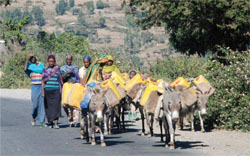10.1.2 Stakeholder participation in health research
Many health-related problems and concerns are interrelated and are influenced by factors in other areas beyond those directly connected to health. For example, health may be affected by problems concerning agriculture, water, roads, environmental factors, poverty and so on. It is better if everyone directly or indirectly concerned with a particular health or healthcare problem is involved in designing and implementing a health research project (including your community survey). The stakeholders may include policymakers, managers from the health and other public services, healthcare providers, and community leaders and members. Their close involvement helps the research findings to be relevant and accepted by all stakeholders, and the resulting solutions are more likely to make a difference to the health problems identified by the research.
Here are some examples of what can go wrong without full stakeholder participation in health research in a community:
- If decision-makers are only involved after a study is completed, the report may just be shelved and the results ignored.
- If the staff of health and other public services are only involved in data collection, but not in the development of the survey or research proposal, or in the analysis and interpretation of the results, they will have less interest in the research and may not be motivated to collect accurate data or carry out the recommendations.
- If community members are only asked to respond to questions determined by the researchers, the recommendations from the study may not be acceptable because the local cultural context, beliefs and wishes have not been taken into account.
- If community members are not involved in the implementation of recommendations, they may have little concern for whether the actions are feasible, affordable or cost-effective.
The roles that various types of participants will play in the health research will depend on its area of focus and also on the level and complexity of the particular study. For example, the health needs in your community may be connected with problems or deficiencies elsewhere, such as agriculture (e.g. whether there has been a good harvest), water (e.g. whether clean drinking water is available, Figure 10.2), roads (e.g. how long it takes to get to the health centre), or broader environmental factors (e.g. how much rain there has been). Health research to identify problems that have a connection to factors outside the health system will require collaboration with all the concerned parties in order to design effective solutions.

In the sections that follow, because of the participatory nature of health research, especially your community survey, we will use the term ‘researcher’ to mean anyone actively involved in planning and conducting the survey or other research – which of course includes you!
10.1.1 Guidelines for health research
